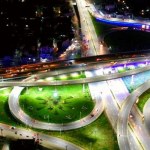It could take a decade for Dubai’s troubled property market to recover with the latest published report indicating prices could fall by up to 30% from current levels.
The outlook from analysts at investment bank UBS is extremely pessimistic. Despite real estate prices in the city already falling at least 50% from the peak of the market in 2008, the UBS report sees another 20 to 30% decline in the pipeline.
Analyst Saud Masud said that a diminishing populations and concerns about oversupply next year as more projects are completed means that Dubai’s residential property market may be 25% oversupplied by the end of 2010.
‘We expect it will take at least a decade for property prices to return to previous peak levels, and see only modest growth in real estate asset prices subsequent to a market trough in 2011,’ he said.
The report predicts that the emirate’s population will shrink by 8% this year and by 2% in 2010. It points out that that nearly 50% of the workforce is employed in real estate or construction, industries where 70% of projects have been delayed or cancelled.
The report also indicates that there will be an excess of 30,000 to 40,000 residential housing units in the next 12 to 18 months in the best case scenario and 90,000 in the worst case.
Analysts are not impressed by recent reports of modest property price increases and say this is mainly due to owners keeping their properties off the market and low transaction volumes.
A lot depends on how well the economy performs.
Should GDP growth slow to 6% per year in the 10 years after 2011, and ‘generously’ assuming that house prices still grow at the same pace relative to GDP, this would lead to annual growth of 9% in real estate prices, the report says.
On the face of it this might appear a good outlook, the even this would not take property prices back to peak levels.
Job creation will be the key to boosting Dubai’s economic growth and, consequently, real estate values, Masud said.
‘This will be a complex issue as the Emirate redefines itself over the coming years and finds new growth levers outside the property sector, through commerce, education, banking, tourism and healthcare,’ he explained.







